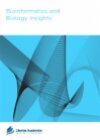


Aims and Scope
Bioinformatics and Biology Insights is an open access, peer-reviewed journal that considers articles on computational methods used in the analysis and annotation of structures, in addition to other areas of computational biology and the broader field of biology.
It both complements Libertas Academica’s subject-specific journals in the area and also seeks to place bioinformatics in the broader context of biology. The journal welcomes all submissions in the field of bioinformatics and also submissions dealing with the relationship between bioinformatics and the broader field of biology. Submissions of original research, reviews, tutorials, rapid communications, expert commentaries, letters, application notes, and point–counter-point articles are welcomed for peer review. No word limits are imposed, but authors are reminded that excessive word-counts may attract adverse comment by peer reviewers and discourage readers.
The submission of tutorial-type articles is encouraged, in which methods which have been developed in the recent past are reviewed in such a way as to make them readily comprehensible for Biologists. Papers discussing methodologies are discouraged unless they explicitly demonstrate that new biological insights have been gained or that earlier methods used to gain a new insight can be replaced.
Authors are encouraged to consider submitting their manuscripts to Evolutionary Bioinformatics and Cancer Informatics, if they consider that their manuscript is exclusively or specifically relevant to those journals’ audiences.
Standard Author Services
The journal distinguishes itself from others in the field by combining individualized author service with editorial integrity and procedural efficiency. At every stage authors will be introduced to the staff member responsible for their paper and will receive procedural explanations and regular status updates. The progress of authors’ papers is continually monitored by staff, and a staff member is always available to answer authors' questions. This is reflected in our consistently positive author testimonials.
Submission to first editorial decision including rigorous, expert peer review in average four weeks
Rapid publication in two to four weeks after acceptance
No deadlines for corrections to typeset proofs
Paper announcement after publication through scholarly databases, social media, and opted-in newsletters
Open access visibility and flexibility with no restrictions on author archiving
CC-BY-NC licensing to prohibit unrestricted commercial re-use, CC-BY available on request
Article level usage metrics (in beta)
Permanent availability by leading institutional libraries under CLOCKSS and LOCKSS systems
Proactive, professional journal staff
Optional Author Services
Discounted article reprints
English proof reading
Pre-submission paper-matching and editor in chief consultation
Pre-peer review language polishing and paper formatting
Video abstracts
Ebook on enhancing article visibility
Social media promotion
Current Article Processing Fees
As an open access journal authors are charged an article processing fee after acceptance for publication by the editor in chief or associate editor. Fees do not vary based on factors like word count or use of color images, and there is no fee charged upon submission. Current fees are given below:
Authors in North America: US$1848
Authors in Japan: ¥ 220,500
Authors in other countries: €1549
More information on article processing fees and availability of waivers and discounts are available on the article processing fees webpage.
Manuscript Types and Preparation Guidelines
Information on manuscript types accepted for peer review and guidelines for manuscript preparation are available here. A template manuscript, sample manuscript, and pre-submission check list is available here.
Editorial Policies
All articles are subject to single-blind independent peer review by reviewers drawn from the journal's editorial board, volunteer peer reviewer pool, and where necessary from Pubmed. Pubmed is used where specialized expertise is unavailable from the other sources. Two to four peer reviewers will be used. Editorial decisions are made by independent editors in chief or associate editors. The editorial process from peer review to first editorial decision takes three to four weeks following acceptance of each paper for peer review.
In the open access business model many editorial decisions result in a fee payment to the publisher. Because of this we maintain a strict distinction between editorial decisions, made by editors in chief or associate editors, and business decisions. Libertas does not make nor attempt to influence editorial decisions. Editorial decision makers receive no incentives to make decisions leading to fee payments.
The journal is committed to high standards of integrity. Authors are required to confirm their compliance with ethical and legal requirements upon submission. Prior to publication all authors must provide signed confirmation of compliance. Where concerns arise the journal will apply the Committee on Publication Ethics guidelines on ethical matters.
Frequency of Publication
Articles are published upon completion of production.
Citing Articles
Article citations follow this format:
Authors: Title. Journal [year]:[volume] [first page]-[last page]
Open Access
This is an open access journal which means that all content is freely available without charge to the user or his/her institution. Users are allowed to read, download, copy, distribute, print, search, or link to the full texts of the articles in this journal without asking prior permission from the publisher or the author. This is in accordance with the BOAI definition of open access.
Inquiries
Correspondence should be sent to . Contact details for Libertas staff are available here.
Additional Information for Authors
Bioinformatics and Biology Insights helps to reach all people with the latest results on research which directly helps them and with their needs. Three of our co-authors are from Burkina Faso, the malaria holoendemic region our research is based on, and serving as motivation for all our efforts for better treatment of malaria. It is good to be social and it is good to promote science world-wide through open access.
Facebook Google+ Twitter
Pinterest Tumblr YouTube